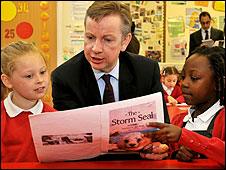Free schools could be set up in shops and houses - Gove
- Published

Michael Gove says the changes will drive up standards for all
Parents, teachers and other groups will be able to set up "free schools" in shops and houses.
Education Secretary Michael Gove has confirmed he is to relax planning laws to make it easier to set up the new state-funded independent schools.
He says the schools will help drive up standards and cut the achievement gap between rich and poor.
More than 700 groups have expressed an interest in setting up a school in England.
A threshold of just 40 or 50 parents will be needed for a primary school bid, with more support needed for a secondary school, Mr Gove told a news conference.
The government is setting out how parents, teachers, charities and other groups can apply to set up their own "free school".
It has launched an online guide and a 10-page application form needed to start the process.
Groups will have to show demand from parents, the school's aims, curriculum, teaching methods and possible sites for the school.
Mr Gove has also said £50m has been set aside to cover start-up costs for free schools.
This - an initial tranche - was the re-allocation of funds for "harnessing technology".
The free schools scheme is one of the two key plans set to change the shape of England's schools system.
The other is the academies programme, where good schools are being encouraged to opt out of local authority control.
Some schools are due to convert to academies in the autumn.
The government expects the first of the new breed of "free schools" to open in September next year.
It says 720 groups have expressed an interest in starting schools - half of them teachers.
At the moment, planning laws and building regulations restrict which buildings can be used for schools.
Education Secretary Michael Gove said it was "amazingly complicated" not just to build a new school, but to convert an existing building into a school - but that would change.
"We don't need to have the degree of prescription and regulation that's governed school buildings so far," he told journalists.
Mr Gove says "free schools" are a way of raising achievement in areas where local authority-run schools are not providing a good quality education.
He says a similar system has helped to improve dramatically the education of poorer children in some cities in the USA.
"In America, some of the most successful schools that have been set up have been set up by teachers.
"We have been joined by teachers from the state sector who want to branch out and set up their own schools and they particularly want to target the disadvantaged.
"They want to make sure that the achievement gap is closed."
Speaking on the Today programme on BBC Radio Four, Mr Gove said the main motivating factor behind the programme was the desire to close the attainment gap.
"We have one of the most segregated, stratified school systems in the developed world," he said.
Mr Gove said the schools would be monitored by England's schools inspectors Ofsted and would face closure if they failed.
"I am not anticipating failure. I am anticipating success. But we will be rigorous in ensuring that those who do go down this road are equipped to make it a success," he said.
"And if they falter, if things goes wrong, if there's any jiggery-pokery, schools will close."
A new body called the New Schools Network has been set up to advise groups on how to set up schools. It works on behalf of the government and has been given a grant of £500,000.
It also links groups to "education providers", including charities and private companies, who would set up trusts to organise the day-day running of the schools.
In most cases, parents themselves might play a role on a new school's governing body but would not be involved in teaching or the running of a school.
The first stage of the application process involves groups setting out their aims and "vision" for the school and the area they hope to serve as well as showing demand from parents.
They will also need to have ear-marked possible sites for the school and give details of any organisation they plan to work with.
Vetting questions are also asked about the individuals involved in the bid: whether any are barred from working with children or are bankrupt, convicted criminals or have ever been members of proscribed organisations.
At a later stage, groups would need to give a full business plan, setting out the school's financial viability and a detailed breakdown of its curriculum.
Sweden
Free schools will not have to follow the national curriculum but will need to provide an education that is "broad and balanced", in the same way as new academies will.
The scheme is similar to the Charter Schools programme in the USA and the system in Sweden, where non-profit and profit-making groups can set up schools - funded by the government but free from its control.
NUT general secretary Christine Blower said: "Rather than providing opportunities to all parents, it will privilege the few at the expense of the many.
"Despite reassurances from Michael Gove that 'free' schools would not be run for profit, there is the strong possibility under this system that governing bodies could increasingly contract out the running of schools to private companies in return for management fees.
"Adopting such a business model to our schools will amount to the sweeping dismantling of our education system, turning it over to unaccountable, unelected companies."